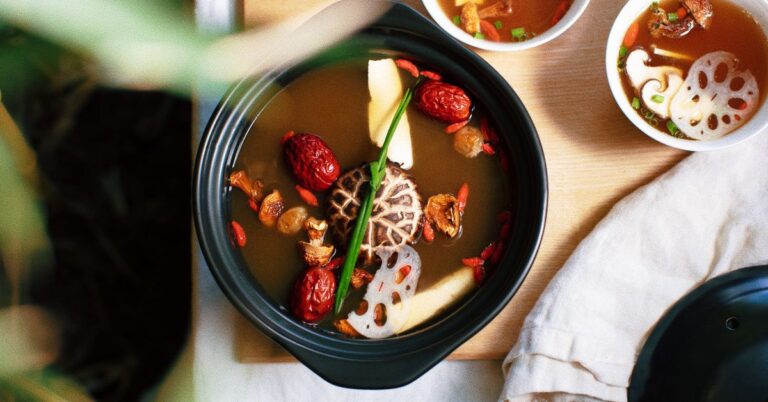During the nine years that Silas Lee spent in Hong Kong, he found the ubiquitous soup stalls on every street corner to be one of the most distinctive features of the cityscape. These herbal medicine shops range from small mom-and-pop establishments to large chains, each selling custom-made herb packs for customers to take home and prepare, or providing ready-to-consume herbs.
“In Hong Kong and China, there's an herbal tea shop on almost every street corner,” says Silas. “If you have a headache, a runny nose, or you're on your period, you just walk in, explain your situation, and they give you a little bowl of soup or herbal tea. You drink it, and… [on the spot] And go about your day.”
Taking inspiration from these soup stalls, Lee and his partner Grace founded Ama Healing Soups, a new Cantonese herbal soup kitchen that also offers takeout and delivery. Ama serves pre-made soups aimed at boosting immunity, balancing “heat” — a Chinese medical concept — and providing nutrition for postpartum and breastfeeding mothers. The Lees hope that Portland's large Cantonese community, combined with the city's adventurous food culture, will find Ama popular.
“I know there are a lot of Asian people in Portland and America, like me, who grew up eating these soups at home,” Silas says, “but they don't necessarily know how to make them themselves. It's nice to find customers who are knowledgeable about these soups.”
The couple, both with media backgrounds, met while working for the Asian record label 88Rising, a job that left them both burned out and moving back to Grace's home state of Oregon. Having grown up in a household where there was a variety of soup on the stove for every meal, Silas shared with Grace, who is white, the Cantonese soup culture he experienced growing up. Grace was immediately drawn to the tradition. “My mom, my grandma, my grandmothers all know how to make these soups,” Grace says. “And there's a soup for every occasion, even the seasons. There's a deep-rooted understanding of when to eat soup.”
When Grace became pregnant, Silas' family began sharing their knowledge with her, offering advice on soups to make during pregnancy and after birth. It became a source of bonding between Grace and her in-laws, and as she practiced making soups, it also helped ease Silas' homesickness. “In Oregon, Silas is far away from his culture and his family,” Grace says. “And now, having a daughter, I wanted to recreate some of that culture in my own home.”
Ama's menu includes a special soup for postpartum recovery, with ingredients believed to replenish essential nutrients, rehydrate and aid tissue repair. Postpartum depression after giving birth is a common practice in many Asian cultures; this period is meant to help women recover from pregnancy and childbirth. Grace quotes Heng Ou's postpartum guide: The first 40 dayswhich It was released in 2016 and helped the concept gain traction in the United States.
In Chinese culture, recipes are often taught directly rather than clearly documented, so the couple partnered with their friend, chef Jeremy Adair, to help them fine-tune Ama's soup recipes. They also consulted Hong Kong herbal soup shop, Check Check Ching. Ama sources its ingredients, including night-blooming cactus, cordyceps sinensis, and lily bulbs, from Sam Bao Trading, an herb shop inside Shun Fa Supermarket.
“We wanted to create a soup that was perfect for new parents because we've been through that time ourselves and realized how limited the options for tasty foods are at that time,” Grace says.
Ahma is located at 333 SE 2nd Avenue.


